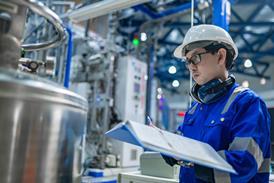Today the Government announced further targeted measures, in an effort to bring energy costs for key UK industries in line with other major economies around the world. The British Industry Supercharger will look to reduce the network charges that industrial users pay for their electricity, and to increase exemptions from the costs of Government support for the renewable energy sector.
Steve Elliott, Chief Executive of the Chemical Industries Association, which represents the UK’s chemical industry said: “Without yet seeing the detail, the announcement is welcome news for UK manufacturers that have been faced with an increasing disadvantage on electricity prices over the last ten years. A more competitive electricity price for industry makes the UK a more attractive investment opportunity, with positive implications for both growth and the net zero transition. But the package only applies to a limited number of firms while many more are still subject to high and increasingly volatile prices. Which is why we stand fully behind the Secretary of State’s commitment to be the economy with the cheapest wholesale electricity price by 2035. We look forward to working with him and his new department on the reforms needed to get us there.”
ENDS
NOTES
For more information or to interview Steve Elliott, please get in touch - Simon Marsh at MarshsS@cia.org.uk or 07951 389197 or Diana Tamayo at tamayod.cia.org.uk 07885 831615.
- Businesses who make chemical products and solutions are integral to something like 96% of all manufactured goods. Whether it is ingredients for food and medicines; paints and coatings for cars and planes or materials for mobile phones and electric vehicle batteries, the chemical industry is truly the “industry of industries” – also playing a critical role in the nation’s response to Covid-19 through its supply of hand sanitiser, PPE and vaccine ingredients.
- Chemical businesses are located throughout the UK, with many of them clustered together in the North East of England, North West of England and Central Scotland. These factories and laboratories, operated by a highly trained and skilled workforce, make a significant contribution towards the UK’s productivity performance – double that of any other manufacturing industry and triple that of any part of the UK economy.
- Nearly half a million people are employed in the sector or have roles that are dependent on the sector. Chemical workers typically earn around 35% more than other manufacturing industries and almost 50% more than the average worker.
- From Runcorn to the Humber Bank; from Teesside to Grangemouth, chemical businesses and their employees right across the country are essential to the Government’s levelling-up agenda.
- We are one of the country’s biggest manufacturing exporters, sending goods to the value of more than £54 billion to other countries. The EU represents our most important market, but we continue to work closely with Government to inform and secure UK trade deals with other key chemical markets such as Japan and the USA.






















